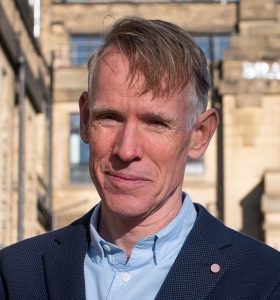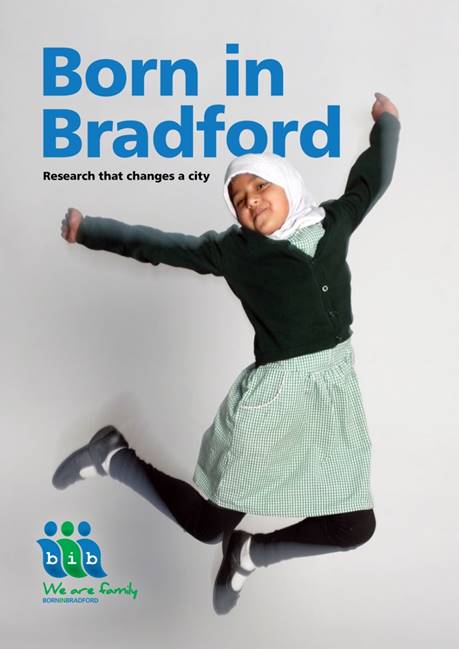Saturday 30th September 2023
How it went – write up by Roger Gill
We felt blessed to be at an evening devoted to the famous Born in Bradford project, because, as John said in his opening remarks: ‘Hebden Bridge is, after all, really a suburb of Bradford.’ There was a millisecond pause before the audience worked out that here was a man with a sense of humour who promised to take us on a warm-hearted journey guided by someone who had perfected the art of talking with his tongue firmly in his cheek.
There was even more praise, when the Lit & Sci, which mounts literary and scientific events, was said to be trying to mend the schism between science and the humanities – an issue that was famously identified in C.P Snow’s Rede Lecture (1959) entitled The Two Cultures. As a warm-up for what was to come, it was all going well, and then he garnered more goodwill will by reading, to applause, The Bard of Barnsley, Ian McMillan’s poem about being born in Bradford.
Well buttered up, we were in a good enough mood to absorb his first clutch of slides which told the depressing story, sadly familiar to many people sitting there, about poverty, ill health – both physical and mental – and inequality while also invoking Karl Marx by identifying need to do something about it. While the rich across the world get richer the poor get poorer and their life expectancy decreases. What better place to try and do something about these world-wide ills than Bradford, one of our most deprived, multi-cultural cities. Born in Bradford started 16 years ago when 12,500 pregnant women were recruited to the study between March 2007 and December 2010. The lives of their 13,500 children are being tracked through research studies and the use of routinely collected medical and educational data.
Optimism started to run as an undercurrent from then on because notwithstanding the inevitable stumbling blocks on the way, the Born in Bradford project has ever widened its scope in terms of people across the city volunteering to be part of the project and organisations lending their skills and talents in an intricate web of co-operation and collaboration.
John, of course, played down his personal contribution, paying respect to the hundreds of dedicated citizens of Bradford who were making a difference, but we internally brushed his modesty to one side, because we had standing before us, a marvellous leader who seemed to embody the spirit of a project that was trying to use big data, a network of keen organisations and thousands of committed individuals to make a difference to the lives of everyone in the city. No wonder Bradford is looking forward to its turn to be a City of Culture in 2025. This is the year when the original cohort of young children become eighteen and will form a vital source of information about what has influenced their development. The teams hope to present some important messages in terms of illness such as heart disease, mental health, and cancer. As they say: ‘This is a study that has the potential to promote real change at a local level and also to make major contributions to global knowledge.’
All this against the tide of governmental cut-backs and misguided posturing that has seen children’s nurseries (Sure Start) closed and some established 20 mile-an-hour speed zones in danger of being axed by political popularism.
As we thanked, Professor Wright for such an excellent, inspiring, and well-rounded presentation the general feeling was that we would like him to come back and present the project’s findings, as soon as they are available, because not only we but the whole country need to know.
Born in Bradford is one of the largest health research studies in the world. It has been at the forefront of scientific discovery from genetics through to environment. This people-powered research study has instilled pride in the city and been a catalyst for change from new clinical practice and school environments, through to Clean Air Zones and City of Culture. The talk will cover BiB’s origins and development and discuss how we can address deep inequalities in our region and inspire a new generation.
 John Wright is a doctor and epidemiologist with a background in hospital medicine and public health in the UK and in Africa. He established and leads the Bradford Institute for Health Research and Wolfson Centre for Applied Health Research.
John Wright is a doctor and epidemiologist with a background in hospital medicine and public health in the UK and in Africa. He established and leads the Bradford Institute for Health Research and Wolfson Centre for Applied Health Research.
In 2007 he set up the Born in Bradford (BiB) cohort study which is following the lives of over 13,000 families as their children grow up. Evidence from BiB studies has informed local, national international policies and led to improvements in clinical practice and public health. In 2016 he set up Born in Bradford’s Better Start cohort to test new approaches to providing the best support in the crucial period of early life. In 2019 he established ActEarly – developing a whole systems City Collaboratory approach to improving the health and life chances of children from deprived communities in London and Yorkshire.
He has worked to develop sustainable public health programmes in Africa for 30 years including setting up and running an Ebola Treatment Centre for Doctors of the World in Sierra Leone during the Ebola epidemic. He has reported for the BBC on programmes covering Born in Bradford, Ebola and The NHS Frontline podcast
